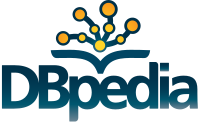DBpedia Spotlight
 |
|
| Developer(s) | |
|---|---|
| Initial release | 10 January 2007 |
| Stable release |
DBpedia 3.11 a.k.a. DBpedia 2015-04 a.k.a. DBpedia 2015 A / September 2015
|
| Repository | github |
| Written in | |
| Operating system | Virtuoso Universal Server |
| Type | |
| License | GNU General Public License |
| Alexa rank | |
| Website | dbpedia |
The project was started by people at the Free University of Berlin and Leipzig University, in collaboration with OpenLink Software, and the first publicly available dataset was published in 2007. It is made available under free licences (CC-BY-SA), allowing others to reuse the dataset; it doesn't however use an open data license to waive the sui generis database rights.
From this data set, information spread across multiple pages can be extracted, for example book authorship can be put together from pages about the work, or the author.
DBpedia has a broad scope of entities covering different areas of human knowledge. This makes it a natural hub for connecting datasets, where external datasets could link to its concepts. The DBpedia dataset is interlinked on the RDF level with various other Open Data datasets on the Web. This enables applications to enrich DBpedia data with data from these datasets. As of September 2013[update], there are more than 45 million interlinks between DBpedia and external datasets including: Freebase, OpenCyc, UMBEL, GeoNames, MusicBrainz, CIA World Fact Book, DBLP, Project Gutenberg, DBtune Jamendo, Eurostat, UniProt, Bio2RDF, and US Census data. The Thomson Reuters initiative OpenCalais, the Linked Open Data project of the New York Times, the Zemanta API and DBpedia Spotlight also include links to DBpedia. The BBC uses DBpedia to help organize its content.Faviki uses DBpedia for semantic tagging.
...
Wikipedia
